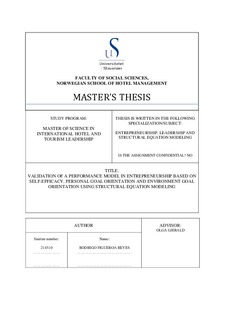| dc.description.abstract | Three are the main contributions that I pretend to provide through this research. First, I will combine four theoretical constructs that, to my knowledge, have not been worked through this way before. I mean that this research is attempting to validate and estimate the existing relationships between Self-efficacy, Perceived Personal Goal Orientation, Perceived Environment Goal Orientation and Perceived Personal Performance.
There is much evidence in the literature that has explored the connections between self-efficacy and the goal theory as I will show later. Those works used to focus on explaining how setting goals improves performance in a varied set of fields. Goals are “what an individual is trying to accomplish; it is the object or aim of an action“ (E. Locke, Saari, L., Shaw, K., and Latham, G., 1981). There is some agreement that setting goals increase performance in two ways: first, there is a direct relation between setting goals and performance, and, second, goals and performance relationship is mediated by self-efficacy: greater performance increase self-perceptions of competence, as a consequence, individuals would set even higher goals (Edwin A. Locke & Latham, 1990).
However, for this project, my focus is on the analysis of goal orientation. For the sake of a better understanding of this project, I have to explain -before going deeper- what is the difference between “setting goals” and “goal orientation”. The former refers to the individual’s actions oriented to establish –formally or informally- future goals related to upcoming events. For example, when a university student is getting ready for final exams might set (as a goals) to obtain A or B grades only. The “goal orientation”, which is the central concept involved in this project, refers to something a bit different: if individuals perceive themselves or their environment as performance oriented (PGO): focus on comparisons to others (i.e., I want the best grade of my class) - or as task oriented (TGO): focus on comparisons to one’s self (i.e., I want to improve my last score in this class). [...] | no_NO |
